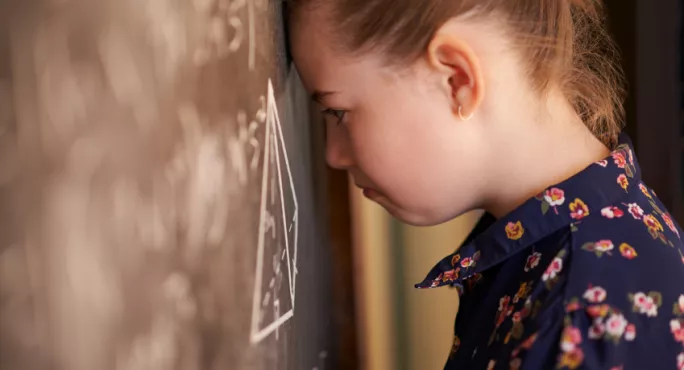- Home
- Election countdown: ‘When voting, remember how urgently pupil mental health needs to be addressed’
Election countdown: ‘When voting, remember how urgently pupil mental health needs to be addressed’


The first is often referred to as prevention, although I prefer to call it promotion. (Prevention suggests that mental health awareness and practice is only relevant to those who might otherwise have developed a mental illness, whereas I am of the opinion that since 100 per cent of humans have a brain, it’s universally relevant). The promotion layer would contain your mental health equivalents of healthy eating and regular exercise - things which everyone should know and do to help support a basic level of health.
The top layer comprises therapeutic care, drug-based intervention or, more often than not, a combination of both in response to diagnosable symptoms of mental illness. Sandwiched between promotion and professional care is a safety net encompassing appropriate responses to the kinds of mental health issues which don’t necessarily require medication or therapy, but do need a degree specialist knowledge.
Traditionally, examples might include academic anxiety, body image related insecurity or very low-level self-harm. A trained teacher, school counsellor, parent or peer supporter might be able to deliver adequate support for these, without deferring to the professional mental health care system.
It’s worth noting that mental health first aid, the art of detecting the early symptoms of poor mental health, responding to a person in crisis and referring them to sources of further advice and support, also dwells within the middle layer. There is a role to be played by the community in recognising when their friends, colleagues and pupils have progressed from the first to the second layer and giving them a leg up to the top layer of care, where applicable.
In the case of young people, the system should look something like this:
Schools should have sufficient time, money and resources to create an environment conducive to their pupil’s mental wellbeing, where habits conducive to the promotion of mental health are practiced as a matter of routine.
Parents would have the knowledge which allowed them to do the same in their homes.
Additionally, a mandatory, funded, specialist-taught PSHE programme would give pupils age-appropriate mental health information. School counsellors and peer supporters would be on hand to talk to pupils about anything that might be troubling them and a couple of staff trained in mental health first aid would keep their expert eyes on the school community, ready to identify and refer those children experiencing or in danger of developing mental illnesses.
In this event, funded and staffed child and adolescent mental health services (CAMHS), recognising that mental illnesses are more treatable the earlier they are detected, would swoop in within a matter of days, providing expedient therapeutic care. Drugs such as antidepressants would theoretically only need to be prescribed as a last resort, if the three layers are working harmoniously and efficiently, as above.
Now, let’s examine what is actually happening:
The education system itself might as well have been designed as an antithesis to mental wellbeing.
Suffocating under the pressure of longer hours, mountains of paperwork, less autonomy and increased responsibility, teachers often, despite their best efforts, fail to stop their own (understandably) high stress levels from cascading downwards towards their pupils. High-stakes testing, as well as a curriculum which increasingly devalues all skills not deemed to be traditionally “academic”, means children and teenagers are experiencing record levels of academic and exam-related anxiety.
Meanwhile, schools face budget cuts which mean they are often having to sacrifice school counsellors and extra-curricular activities which support mental wellbeing. While the government has pledged millions of pounds to train teachers in mental health first aid, they have also cut CAMHS by approximately £85 million since 2010.
This has forced CAMHS thresholds higher, meaning young people need to be exhibiting more severe symptoms in order to “qualify” for care. So while school staff might have become more adept at symptom spotting and response, in many cases there is nowhere to refer their pupils to.
In short, an increasing number of young people are trapped in the centre layer - languishing between an environment which has pushed them to a place where promotion alone won’t be effective, with needs over and above what their friends, parents or teachers might be able to assist them with, but with no services available to them.
In this context, is it any wonder that a Tes investigation published in last week’s magazine found that children were severely self-harming, or even attempting suicide, knowing this was the only way they could expedite a CAMHS appointment? Even in these instances, testimonials from teachers showed that young people are more likely to end up in A&E than in a specialist support unit.
By giving with the hand of prevention (i.e investing in mental health first aid and peer support systems) but taking away with the hand of professional care, the Tories have arguably demonstrated the established theme which runs through their entire manifesto: Advantaging those who are okay right now, at the expense of those who are struggling.
This isn’t for one moment to suggest that prevention strategies aren’t crucial - simply that within a broader context of cuts being made to an increasingly brutal schools climate, it’s akin to pissing in the wind.
Government-endorsed school mindfulness sessions belong in promotion. CAMHS are firefighting only the most critical cases in the top layer - it is the children in between (the squeezed-middle, if you like) who aren’t being acknowledged or catered for.
This situation, blighting the lives of millions of British people, can only be resolved by a government who will acknowledge the entire picture, understand that no layer of mental health care is a substitute for the other, appreciate the urgency involved, rethink policy and re-appropriate funds with expediency.
On Thursday, I urge you to take the memory of this article to the polling booth with you.
Natasha Devon is the former UK government mental health champion for schools and founder of the Body Gossip Education Programme and the Self-Esteem Team. She tweets as @_NatashaDevon.
For more columns by Natasha, visit her back catalogue.
Want to keep up with the latest education news and opinion? Follow Tes on Twitter and like Tes on Facebook.
Keep reading for just £1 per month
You've reached your limit of free articles this month. Subscribe for £1 per month for three months and get:
- Unlimited access to all Tes magazine content
- Exclusive subscriber-only stories
- Award-winning email newsletters


